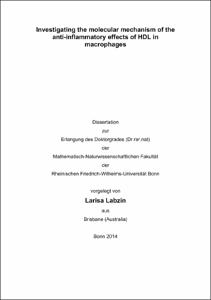Investigating the molecular mechanism of the anti-inflammatory effects of HDL in macrophages

Investigating the molecular mechanism of the anti-inflammatory effects of HDL in macrophages

| dc.contributor.advisor | Latz, Eicke | |
| dc.contributor.author | Labzin, Larisa | |
| dc.date.accessioned | 2020-04-20T21:00:15Z | |
| dc.date.available | 2020-04-20T21:00:15Z | |
| dc.date.issued | 17.03.2015 | |
| dc.identifier.uri | https://hdl.handle.net/20.500.11811/6433 | |
| dc.description.abstract | Inflammation is critical for clearing microbial infections, however, excessive or pro-longed inflammation is an underlying component of many disease states, including atherosclerosis. Macrophages recognise sterile or microbial ligands via receptors such as Toll Like Receptors (TLRs). Activation of macrophages by TLR ligands leads to inflammation, mediated by cytokines and chemokines, which amplify the immune response. Elevated levels of High Density Lipoprotein (HDL) are inversely correlated with cardiovascular disease (CVD) risk and atherosclerosis progression. The protective effect of HDL in CVD is mainly attributed to its ability to remove excess cholesterol from peripheral tissues. In addition, HDL has anti-inflammatory properties, and fittingly, is also protective against inflammatory disorders such as sepsis. However, the molecular mechanisms by which HDL mediates these anti-inflammatory effects remain poorly characterised. Considering the key role that macrophages, TLRs and pro-inflammatory cytokines play in inflammation, the effect of HDL on TLR-mediated macrophage activation was investigated. Human and mouse normo-cholesterolemic macrophages were analysed, so that the anti-inflammatory effects of HDL could be applied to a range of inflammatory diseases beyond atherosclerosis. HDL inhibited TLR-induced pro-inflammatory cytokine expression, at the level of transcription. The transcriptional modulator ATF3 was identified as being responsible for HDL's anti-inflammatory effects on macrophage activation. HDL induced ATF3 expression both in vitro and in vivo, increased ATF3 binding across the genome, as analysed by ChIP Sequencing, and was no longer able to inhibit TLR-induced pro-inflammatory cytokine secretion in ATF3-deficient macrophages. The mechanism by which HDL induces ATF3 is still unclear, however some evidence presented here suggests that this is independent of cholesterol efflux and may require lysosomal catabolism of HDL's phospholipids. This work identifies a new biology for HDL as an anti-inflammatory modulator of macrophage activation via the transcription factor ATF3. | en |
| dc.language.iso | eng | |
| dc.rights | In Copyright | |
| dc.rights.uri | http://rightsstatements.org/vocab/InC/1.0/ | |
| dc.subject | Prothesendesinfektion | |
| dc.subject | Ultraschall | |
| dc.subject | Desinfektion | |
| dc.subject | Zahnprothesen | |
| dc.subject.ddc | 610 Medizin, Gesundheit | |
| dc.title | Investigating the molecular mechanism of the anti-inflammatory effects of HDL in macrophages | |
| dc.type | Dissertation oder Habilitation | |
| dc.publisher.name | Universitäts- und Landesbibliothek Bonn | |
| dc.publisher.location | Bonn | |
| dc.rights.accessRights | openAccess | |
| dc.identifier.urn | https://nbn-resolving.org/urn:nbn:de:hbz:5n-39361 | |
| ulbbn.pubtype | Erstveröffentlichung | |
| ulbbnediss.affiliation.name | Rheinische Friedrich-Wilhelms-Universität Bonn | |
| ulbbnediss.affiliation.location | Bonn | |
| ulbbnediss.thesis.level | Dissertation | |
| ulbbnediss.dissID | 3936 | |
| ulbbnediss.date.accepted | 12.02.2015 | |
| ulbbnediss.institute | Medizinische Fakultät / Institute : Institut für Angeborene Immunität | |
| ulbbnediss.fakultaet | Mathematisch-Naturwissenschaftliche Fakultät | |
| dc.contributor.coReferee | Hoch, Michael |
Files in this item
This item appears in the following Collection(s)
-
E-Dissertationen (4442)




